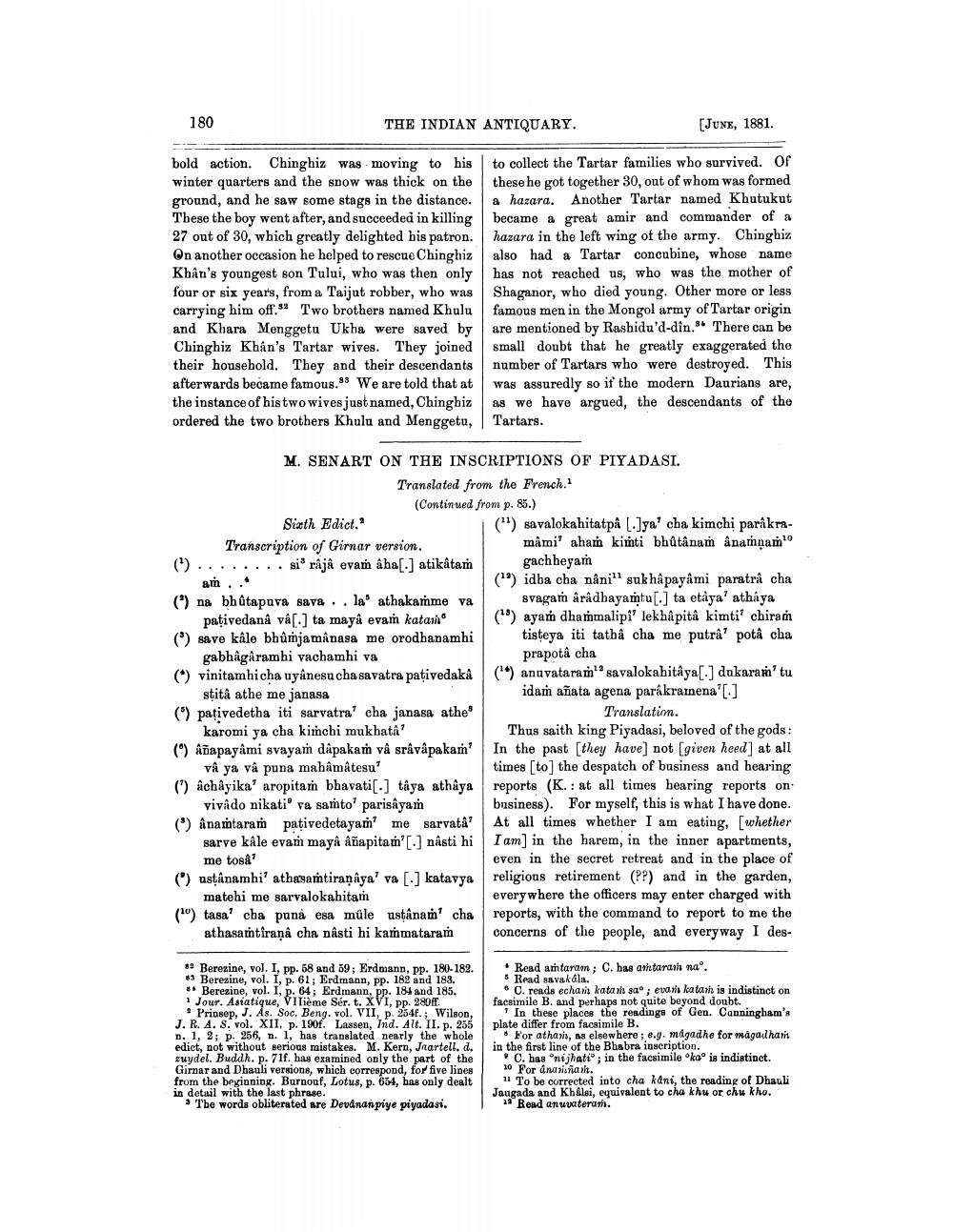________________
180
THE INDIAN ANTIQUARY.
[JUNE, 1881.
bold action. Chinghiz was moving to his winter quarters and the snow was thick on the ground, and he saw some stage in the distance. These the boy went after, and succeeded in killing 27 out of 30, which greatly delighted his patron. On another occasion he helped to rescue Chinghiz Khan's youngest son Tului, who was then only four or six years, from a Taijut robber, who was carrying him off. Two brothers named Khulu and Kbara Menggetu Ukha were saved by Chinghiz Khan's Tartar wives. They joined their household. They and their descendants afterwards became famous. We are told that at the instance of histwowives just named, Chinghiz ordered the two brothers Khulu and Menggetu,
to collect the Tartar families who survived. Of these he got together 30, out of whom was formed a hazara. Another Tartar named Khutukut became a great amir and commander of a hazara in the left wing of the army. Chingiz also had a Tartar concubine, whose name has not reached us, who was the mother of Shaganor, who died young. Other more or less famous men in the Mongol army of Tartar origin are mentioned by Rashidu'd-dîn." There can be small doubt that he greatly exaggerated the number of Tartars who were destroyed. This was assuredly so it the modern Daurians are, as we have argued, the descendants of the Tartars.
M. SENART ON THE INSCRIPTIONS OF PIYADASI.
Translated from the French.
(Continued from p. 85.) Sixth Edict.
i (") savalokahitatpå [.]ya' cha kimchi parakraTranscription of Gimnar version.
mâmi' aham kimi bhutânam anamnamo () ........ si râjâ eva aha(.) atikåtam gachhegam am...
(1) idba cha nåni" sukhâpayâmi paratrå cha (") na bhūtapuva sava .. la athakaṁme va svagań årâdhayamtu[.] ta etåya' athaya
pativedana vás.] ta maya evaṁ katari ("") ayam dhammalipi' lekhâpitâ kimti chiram () save kâle bhûmjamanasa me orodhanamhi tisteya iti tatha cha me putra' potâ cha gabhâgârambi vachamhi va
prapotâ cha (*) vinitamhicha uyanesu cha savatra pațivedakâ (**) anuvataram" savalokahitaya[.] dukaran' tu stitâ athe me janasa
idam ağata agena parákrainena'[.] (") pativedetha iti sarvatra' cha janasa athe
Translation. karomi ya cha kimchi mukhata?
Thus saith king Piyadasi, beloved of the gods: (9) áñapayami svayam dipakaṁ và sråvapakam? In the past [they have not (given heed] at all vå ya va puna mahîmâtesu?
times to the despatch of business and hearing (') acháyika' aropitam bhavati[.) tâya athaya reports (K. : at all times hearing reports on: vivado nikati va saṁto' parisayam
business). For myself, this is what I have done. (1) anamtaram pativedetayam' me sarvata? At all times whether I am eating, (whether
sarve kâle evam maya añapitam [.] násti hi I am) in the harem, in the inner apartments, me tosa?
even in the secret retreat and in the place of () ustanamhi' athasaṁtiranaya' va [.] katavya religious retirement (??) and in the garden, matehi me sarvalokahitam
everywhere the officers may enter charged with (19) tasa? cha puna esa mule ustânam' cha reports, with the command to report to me the
athasamtfranà cha nâsti hi kammataram concerns of the people, and every way I des
89 Berezine, vol. I, pp. 58 and 59; Erdmann, pp. 180-182. $3 Berezine, vol. I, p. 61; Erdmann, pp. 182 and 183. ** Berezine, vol. I, p. 64; Erdmann, pp. 184 and 185. 1 Jour. Asiatique, Vilième Sér. t. XVI, pp. 280ff.
. Prinsep, J. As. Soc. Beng. vol. VII, p. 254F.; Wilson, J. R. A. S. vol. XII, p. 190f. Lassen, Ind. Alt. II. p. 255 n. 1, 2; p. 256, n. 1, has translated nearly the whole edict, not without serious mistakes. M. Kern, Jaartell. d. zuydel. Buddh. p. 71f. has examined only the part of the Girnar and Dhauli versions, which correspond, for five lines from the beginning. Burnouf, Lotus, p. 654, has only dealt in detail with the last phrase.
* The words obliterated are Devananpiye piyadasi.
Read amtaram; C. has antaraın na'. 5 Read savakala.
• O. reads echan kata ra sao; evari katar is indistinct on facsimile B. and perhaps not quite beyond doubt.
* In these places the readings of Gen. Canningham's plate differ from facsimile B.
For athars, as elsewhere; e.g. mdgadhe for magadharit in the first line of the Bhabra inscription.
C. has "nijhati; in the facsimile kao is indistinct. 10 For Anarisvarh.
11 To be corrected into cha kani, the reading of Dhauli Jaugada and Khálsi, equivalent to cha khu or chu kho.
13 Read anuvaterum.




